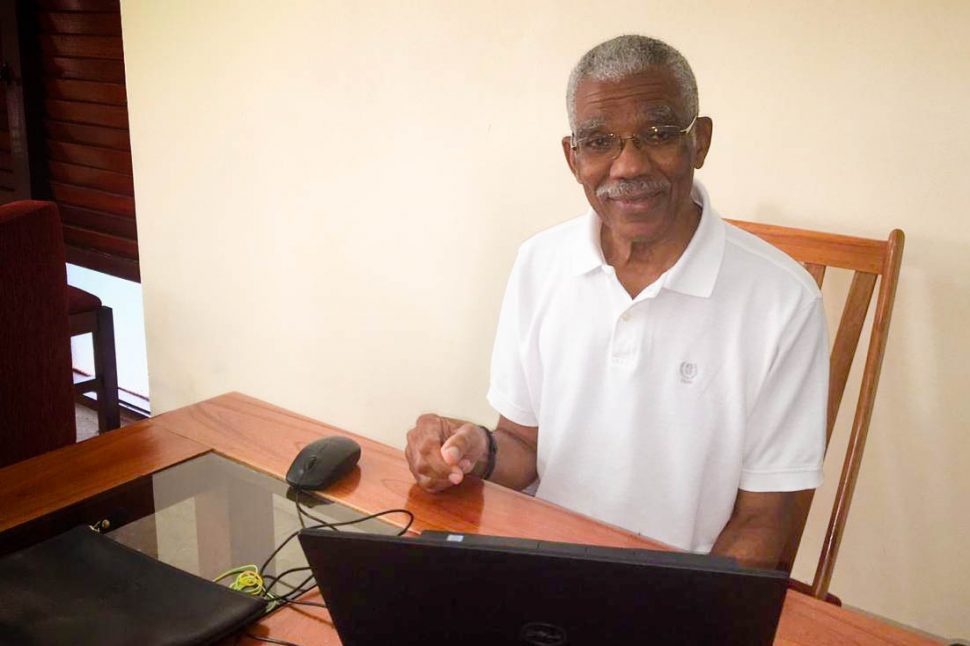President David Granger will undergo further treatment for Non-Hodgkin Lymphoma when he returns to Cuba next week, according to Minister of State Joseph Harmon, who yesterday said Cabinet has not discussed the possibility of him not being able to continue occupying office.
“The analysis that we have is that the president’s condition is completely treatable and that as he receives his treatment, that his condition will get better and better. That is how we work. That is the analysis that we have and that is what we are working on and, therefore, the question of any other issue does not arise at this time,” Harmon said when asked whether Cabinet has started a discussion on what will happen if the president cannot continue to perform his duties. Last month, Granger, 73, in the company of First Lady Sandra Granger, returned home from Havana, where he began treatment after a medical investigation there eventually led to a diagnosis of Non-Hodgkin Lymphoma.
According to the Mayo Clinic, Non-Hodgkin Lymphoma is a cancer that originates in the lymphatic system, the disease-fighting network spread throughout the body. In Non-Hodgkin lymphoma, tumours develop from lymphocytes, which are a type of white blood cell.
It says that “Non-Hodgkin lymphoma is more common than the other general type of lymphoma — Hodgkin lymphoma” and that many different subtypes of Non-Hodgkin lymphoma exist.
According to doctors, age is a huge risk factor in developing the cancer as persons over 60-years-old are at an increased risk but medical research has indicated that there have been “significant “advances” in diagnosis and treatment, which have helped improve the prognosis for people with this disease.
The stage of the cancer affecting the president has not been disclosed and it has since been said that it is up to Granger to make this information public.
At a post-Cabinet press briefing yesterday, Harmon was asked for an update on the president’s health, further treatment and his workload.
In response, he said that while the president has been shouldering a “reduced” workload since his return, he is “in command of the business of the state.”
He said the president is having meetings and is “giving directions and so on and so forth.”
Harmon added that the president is “much better” than when he left for Cuba. So far he has undergone surgery and completed a round of chemotherapy.
The treatment regime, he added, would require the president visiting Cuba on a number of occasions. His next trip will be next Tuesday, when he will receive “additional treatment,” he said.
Harmon stressed that the entire Cabinet continues to support the president’s vision. “We are working together as a coalition government. I believe the president’s illness has actually brought us closer together and we are working assiduously to bring those benefits which the Guyanese people when they voted for us in 2015… required,” he said.
Article 96 of the Constitution makes provisions for the discharge of functions of the president during absence, illness and physical incapacity. “Whenever the President is absent from Guyana or considers it desirable so to do by reason of illness or any other cause he may, by direction in writing, authorise any member of the Cabinet, being an elected member of the National Assembly, to perform such of the functions of the office of President as he may specify and the person so authorised shall perform those functions until his authority is revoked by the President or until the functions are resumed by the President,” Section 96(1) states.
It goes further to explain what happens if the president is unable to authorise a person to discharge his functions.
“If the President is incapable by reason of physical or mental infirmity of discharging the functions of his office and the infirmity is of such a nature that the President is unable to authorise another person under this article to perform those functions— (a) the Prime Minister; or (b) during any period when there is no Prime Minister or the Prime Minister is absent from Guyana or is, by reason of physical or mental infirmity, unable to perform the functions of his office, such other Minister, being an elected member of the National Assembly, as the Cabinet shall elect; or (c) if there is no Prime Minister and no Cabinet, the Chancellor, shall perform the functions of the office of President…,” it states.






